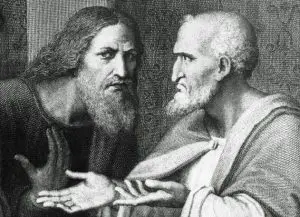In part 1 of The Jewish Mind vs The Translators’ Bias, we began our examination of what is commonly viewed as the quintessential proof text for Jesus’ pre-existence: the prologue to John’s gospel.
John 1:1-3 (NASB) In the beginning was the Word, and the Word was with God, and the Word was God. 2 He was in the beginning with God. 3 All things came into being through Him, and apart from Him nothing came into being that has come into being.
The Translators’ Bias
We looked at the first of three grammatical considerations that need to be taken into account when rightly interpreting the passage: the use of capital letters. The original Greek manuscripts were written using all capital letters, thus the text does not designate “word” as a proper noun. Nevertheless, the translators chose to make it one by capitalizing “Word” throughout the passage. In doing so, they deviated from the almost 1,800 occurrences in Scripture where logos (or dabar in Hebrew) is used to mean a word embodying an idea or thoughts expressed in words, and never as a person. It was God’s logos, that is His word, idea, plan or purpose that was made manifest in the life of Jesus.
Of particular importance, we learned that even Trinitarian scholars admit that “Word” or logos in John 1 is not a reference to Jesus’ deity, nor would it have been interpreted as such by early Christians. James Dunn, Trinitarian theologian and author who specializes in New Testament Christology writes:
Initially at least, Christ was not thought of as a divine being who had pre-existed with [YEHOVAH] God but as the climactic embodiment of God’s power and purpose — his life, death and resurrection understood in terms of God Himself reaching out to men. Christ was identified not with some heavenly redeemer figure but with God’s creative wisdom, God’s redemptive purpose, God’s revelatory word expressed in a final way that made the Christ-event the normative definition of divine wisdom and revelation — God’s clearest self-expression, God’s last word.[1]
In this post we’ll examine the remaining two grammatical considerations needed for rightly interpreting John’s prologue: the use of personal pronouns and the treatment of a descriptive noun
Textual Consideration #2: The use of the personal pronouns “He” and “Him”
Notice the use of the personal pronouns “He” and “Him” used to refer to the “Word” in the passage under review:
John 1:1-4 (NASB)In the beginning was the Word, and the Word was with God, and the Word was God. 2 He was in the beginning with God. 3 All things came into being through Him, and apart from Him nothing came into being that has come into being. 4 In Him was life, and the life was the Light of men. (emphasis added)
Not only did translators use the personal pronouns “he” and “him” to refer to the “Word,” they also capitalized them, further biasing the unsuspecting reader that the “Word” is the pre-incarnate Jesus. But is this the case? Are masculine pronouns an appropriate translation in this instance?
Many languages assign a gender to nouns
Many languages arbitrarily assign gender to nouns, along with the corresponding pronouns. For example, “book” in Spanish is libro. It has been assigned the male gender “el” and thus is written “el libro.” But when translating el libro into English we would drop the “el” or the pronoun “he” and simply say, “book.” When translating a referring pronoun (a pronoun used in lieu of the noun) we would exchange the “el” or “he” for the neuter pronoun “it,” because in English we would never refer to a book as a “he.”
Like Spanish, the Greek language assigns a gender to nouns
In like manner, the Greek language assigns a gender to nouns. In John 1, “Word” or logos in Greek is assigned a male gender, and thus masculine pronouns. But when translating the pronouns that correspond to logos into English, we would replace “he” and “him” with the pronoun “it.” In other words, instead of saying in John 1:2 “He was in the beginning with God” we would translate the phrase, “it was in the beginning with God.” Because in English, “word” (like “book” in Spanish) is never a “he.” Trinitarian translators, however, failed to follow this basic translation principle. Instead they retained the masculine pronoun used in Greek in order to emphasize their bias that “word” or logos is the pre-incarnate Jesus. It is important to note that there is nothing in the text that would grammatically require them to keep the masculine pronoun. In fact, no other place in Scripture is “word,” (i.e. logos) translated as “he” or “him.” It is never a person. The translators always exchange the masculine pronoun for “it.” For example:
Matthew 13:20 (NASB)”The one on whom seed was sown on the rocky places, this is the man who hears the word [logos] and immediately receives it with joy.” (emphasis added)
Even though “word” or logos is masculine, it is rightly translated as “it” and not “he.” Another example is found in the gospel of Luke:
Luke 11:28 (NASB) But He said, “On the contrary, blessed are those who hear the word [logos] of God and observe it.” (emphasis added)
The text does not say, “observe Him” but “observe it.” Further still, Paul’s letter to the Corinthians offers another example of when translators followed this basic translation principle:
1 Corinthians 1:18 (NASB)For the word [logos] of the cross is foolishness to those who are perishing, but to us who are being saved it is the power of God. (emphasis added)
In these and other examples, the translators rightly chose to translate the masculine pronoun in Greek as a neuter one in English. They did this every time, that is, except for John 1:1-4. Their deliberate choice to ignore this fundamental translation principle exposes their bias.
Bible translations prior to the King James Version
Prior to the translation of the King James Version in 1611, there were eight major English translations of the Bible:
-
- Tyndall Bible in 1526, 1534
- Matthew’s Version in 1535, 1537 (a.k.a. Thomas Matthew’s Bible)
- Taverner Bible in 1539, 1540
- The Great Bible 1539 (a.k.a. Thomas Cranmer’s Bible; he wrote the preface)
- Whittingham in 1557
- Geneva Bible in 1560, 1599 – Bible of the Protestant reformation
- Bishops Bible in 1568, 1595
- Coverdale in 1550 (a.k.a Cloverdale)
All of these major translations[2] dropped the Greek masculine pronouns assigned to “word” or logos and used the neuter pronoun “it” or the phrase “the same” instead. Here’s the Tyndale Bible translation as an example. (Note the spelling has not been modernized.)
Tyndale Bible – John 1:1-5 In the beginnynge was the worde and the worde was with God: and the worde was God. 2The same was in the beginnynge with God. 3All thinges were made by it and with out it was made nothinge that was made. 4In it was lyfe and the lyfe was ye lyght of men 5and the lyght shyneth in the darcknes but the darcknes comprehended it not.[3] (emphasis added)
James Dunn, Trinitarian author and theologian, agrees that the “word of God” is not a “who”, but an “it”:
“…nowhere either in the Bible or in the extra-canonical literature of the Jews is the word of God a personal agent or on the way to become such.”[4]
The word of God is not a person, but an “it” or a “what” as further evidenced by John in his first epistle.
1 John 1:1-3 (NASB) What was from the beginning, what we have heard, what we have seen with our eyes, what we have looked at and touched with our hands, concerning the Word of Life— 2 and the life was manifested, and we have seen and testify and proclaim to you the eternal life, which was with the Father and was manifested to us— 3 what we have seen and heard we proclaim to you also, so that you too may have fellowship with us; and indeed our fellowship is with the Father, and with His Son Jesus Christ.
Summary: Textual Consideration #2
By retaining and capitalizing the Greek masculine pronouns, “he” and “him” instead of exchanging them for “it” in the prologue of John’s gospel, the translators have once again, brought their bias into the text and mislead the reader.
Textual Consideration #3 – The descriptive noun
Let us now examine the third and final textual consideration for John 1.
John 1:1 (NASB)In the beginning was the Word, and the Word was with God, and the Word was God. (emphasis added)
The Word was God
The word “God” or “god” in Greek is theos. It appears 1,300 plus times in the New Testament, and it almost always refers to Yahweh. (An exception would be in 2 Corinthians 4:4 where it refers to Satan as the “god of this world.”) Since theos can be used of the one true God, as well as false gods and even men who are called gods, the question becomes how to differentiate between these “gods” when writing about them.
In English, we differentiate between God and other so called gods by capitalizing the “G” when it refers to Yahweh. But since New Testament Greek manuscripts were written using all capitalized letters, another way was needed to differentiate between God and gods. Therefore, in order to signal to the reader that theos is referring to God (Yahweh), the New Testament writers add the definite article “the” which is “ho” in Greek. Thus, ho theos or “the God” is used to refer to Yahweh. Strong’s Exhaustive Concordance agrees when it says that theos speaks of the supreme Divinity especially with ho.[5]
So in John 1:1 when we read, “the Word was with God,” “God” in this phrase is identified as ho theos (or more precisely ho theon), designating for the Greek reader that John is referring to “the God” or Yahweh. In this same verse when theos (without the article) follows ho theos it is said to be qualitative and thus descriptive of the character of God. In this situation, the noun theos becomes a descriptive or adjectival noun. An example of an descriptive noun that acts as an adjective is seen in the statement: Mike is a college student. The phrase “college student” is made up of two nouns. But in this instance, “college” takes on the role of an adjective, describing the kind of student Mike is.
Consequently, when we read in John 1:1, “In the beginning was the Word, and the Word was with God (ho theos), and the Word was God (theos)” we now understand that the first “God” (ho theos) refers to Yahweh, but that the second “God” (theos), which does not have the definite article (ho), serves as a descriptive noun and functions like an adjective. The “word of God (theos)” is like God in some way, but not identical to God. In other words, instead of saying, “the Word was with God and the Word was God,” it should be translated “the Word was with God and the Word was god-like.”
According to many Trinitarian scholars this is patently wrong.
When the translators failed to properly deal with this descriptive noun it wrongly gives the impression that the Word is God Himself. But according to many Trinitarian scholars this patently wrong. For example, William Barclay, Biblical scholar and author, writes in his commentary on The Gospel of John:
“When Greek speaks about God it does not simply say ‘theos’; it says ‘ho theos.’ Now, when Greek does not use the definite article with a noun, that noun becomes much more like an adjective; it describes the character, quality of the person. John did not say that the Word was ‘ho theos;’ that would have been to say that the Word was identical with God.” (emphasis added)[6]
In addition, F.F. Bruce, respected Bible scholar and author, in his commentary on The Gospel of John writes:
“Had theos as well as logos been preceded by the article [the or ho] the meaning would have been that the Word was completely identical with God.”[7] But that is not how John structured the sentence.
Furthermore, The Expositor’s Greek Testament says:
“The Word is distinguishable from God, yet the Word was God, of divine nature; not ‘a God’ to which the Jewish ear would have been abominable, not yet identical with all that can be called God, for then the article would have been inserted.”[8]
Moreover, The New American Bible Revised Edition says of John 1 that the “Lack of a definite article signifies predication rather than identification.”[9] In other words, the Word had the quality of God but was not identical to God.
Lastly, minister and author, Ray Faircloth, in his work entitled, The Prologue to John’s Gospel, quotes Dana and Manty’s Manual Grammar of the Greek New Testament which says:
Since “God’ does not have the article preceding it, “God” is clearly the predicate and “the Word” is the subject. This means that “God” here is the equivalent of an adjective, and this justifies the rendering “the Word was the same as God.”[10]
Indeed, this is how Biblical scholar, linguist and author, Sir Anthony Buzzard in his seminal translation of the New Testament translates the phrase in question: the word (logos) was “fully expressive of God Himself.”[11]
Summary: Textual Consideration #3
To translate John 1:3 as “the Word was God” represents yet another translation bias aimed to mislead the reader into thinking that the Word was God Himself, instead of what John and his first century readers would have understood it to mean: the thoughts, ideas, plan, purpose of God are expressive of who God is. An unbiased and therefore more accurate translation of John 1:1-4 would be:
In the beginning was the word, and the word was with God, and what God was, the word was. All things were made through it, and without it was not anything made that has been made. In it was life and the life was the light of mankind. [12]
Now that we have a better understanding of what John’s prologue actually says, we’ll turn our attention in the next installment in this series to the church fathers and how their understanding of John’s prologue introduced a powerful bias into mainstream Christian thought.
[1] James D.G. Dunn, Christology in the Making, (Grand Rapids, MI: William B. Eerdman’s, 1989), p. 262.
[2] For further study on Bible translations: Anthony Buzzard, “John 1:1f in 50+ English Translations”
[3] William Tyndale, Tyndale Translation online, accessed 4-23-19, http://studybible.info/Tyndale/John%201
[4] James D.G. Dunn, Christology in the Making, (Grand Rapids, MI: William B. Eerdman’s, 1989), p. 219.
[5] James Strong, Strong’s Exhaustive Concordance, accessed online at http://biblehub.com/greek/2316.htm on 04-23-19.
[6] William Barclay, The Gospel of John, Vol. 1 (Glasgos: Saint Andrews Press), p. 39
[7] F.F.Bruce, The Gospel of John, (Grand Rapids: Eerdmans, 1983), p. 31
[8] The Expositor’s Greek Testament, Sir William Robertson Nicoll, ed. (New York: Dodd, Mead and Company, 1902), p. 684
[9] New American Bible, Revised Edition (Confraternity of Christian Doctrine, 2011), translators note to John 1:1.
[10] Ray Faircloth, “The Prologue to John’s Gospel,” Focus on the Kingdom, Volume 8, No. 11, Anthony Buzzard, ed., 2006. Accessed 04-23-19, http://focusonthekingdom.org/811.htm
[11] The One God, the Father, One Man Messiah Translation, Sir Anthony Buzzard, Restoration Fellowship, 2014, p. 237.
[12] John 1:1-4, Revised English Version, (Martinsville, IN: Spirit and Truth Fellowship International, 2014), p. 245.




The text ought to read as follows;
In the beginning was the word, and the word was with God, and divine was the word, All things were made through it, and without it was not anything made that has been made. In it was life and the life was the light of mankind. [12]
That is a very reasonable translation. Thanks for commenting.
OGW
…Except, “and The Word became flesh and dwelt among us…We beheld His Glory, the Glory as of the Only Begotten…Abraham rejoiced to see My day…Before Abraham was, I Am…Father Glorify thou me with the glory wherewith I had with Thee before the World began…Thomas said, My Lord and my God…And they worshipped Him…Man your sins are forgiven…who can forgive sins but God alone…No man hath ascended up to Heaven, but the Son of Man that cometh down from Heaven…I Am the Alpha and Omega, the First and the Last…our God and Savior Jesus Christ…” Additionally, there are Jewish sources prior to Pharisaical influences that spoke of the Word of YHWH in the OT as well being personal, having personality as what later theologians would call a Theophany, “YHWH rained down fire from YHWH…The Word of YHWH came to…saying…” God reveals Himself as The Father, Son and Holy Spirit, simultaneously coequal and coeternal, one God.
Thanks for commenting. You refer to passages that primarily post-Biblical converts learned in Greek philosophy have used to develop and then defend the Trinity, a doctrine that is found nowhere in Scripture, as many Biblical scholars will attest. You will find Biblical responses to each of the passages you refer to in the section called Common Verses. I encourage you to check it out.
Blessings,
OGW
Excellent discussion… if this is compared with Psalm 8:5 … it becomes plain imo that John is describing God and the Word as both heavenly beings or spirits. The fact that Jesus lives in perfect agreement or in unity with his Father’s will further emphasizes his authority and relevance as the being that came down from heaven to become a man and serve as God’s spokesperson.
Hello Mark,
Thanks for reading and commenting. You have an interesting take John 1:1 and the theory of Jesus’ preexistence.
You might be interested in reading what Scripture means when it says Jesus Came Down. Also, any authority Jesus has was given to him; it is not inherent. You might find this article interesting as well: Jesus, A Man Under Authority.
Thanks again for reaching out.
OGW